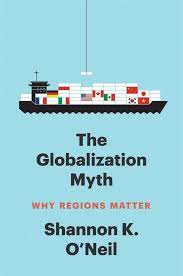The Globalization Myth
Why Regions Matter
Shannon K. O’Neil
The conventional wisdom about globalization is wrong.
Over the past forty years as companies, money, ideas, and people went abroad, they increasingly looked regionally rather than globally. In The Globalization Myth: Why Regions Matter, Shannon O’Neil details this transformation and the rise of three major regional hubs in Asia, Europe, and North America.
Current technological, demographic, and geopolitical trends look only to deepen these regional ties. O’Neil argues that this has urgent implications for the United States. Regionalization has enhanced economic competitiveness and prosperity in Europe and Asia. It could do the same for the United States, if only it would embrace its neighbors.
Published by Yale University Press
Praise for The Globalization Myth
It is regionalisation, not globalisation, that explains the mechanics of prosperity. . . . If hope truly does lie in thought, we need to take our thinking about the world a lot more seriously than we do today.—Richard Horton, The Lancet
[A] lively narrative. . . . Recommended.—J. Gerber, Choice
Regionalization is quickly becoming the new globalization. Shannon O’Neil’s The Globalization Myth deftly explains why the key to America’s continued industrial competitiveness lies neither in ‘America alone’ reshoring nor in laissez faire offshoring, but in nearshoring. An important corrective to a broken public policy debate.—Ian Bremmer, president, Eurasia Group
This is a phenomenal book about regionalization. Global markets are consolidating into three regional hubs. The US needs to act on that, or it will get left behind. I found this a gripping read!—Ann E. Harrison, University of California, Berkeley
